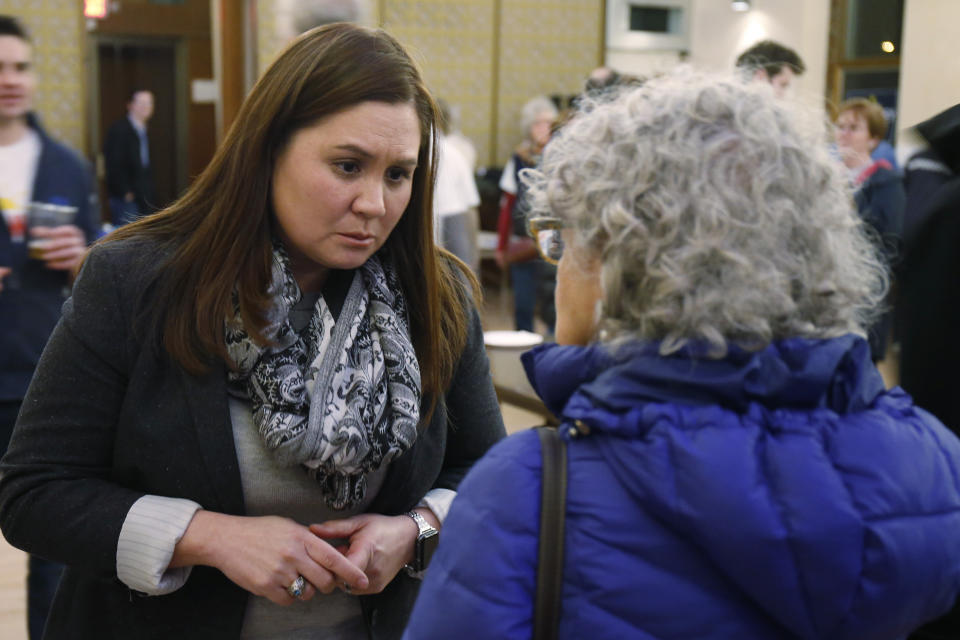Democracy in overtime: Candidates await virus-delayed votes
CINCINNATI (AP) — Political campaigns in some U.S. states have been switching gears or are in limbo awaiting decisions on voting plans after elections were postponed because of the coronavirus outbreak.
Candidates lacking cash and prohibited from staging rallies that are considered mass gatherings have been forced to turn to phone banks or online digital forums.
The situation was especially uncertain for candidates in Ohio, where the public health chief called off in-person voting just hours before the March 17 primary. March madness followed, with battles in court and the Legislature over a new date: The state's election chief, a Republican, picked June 2, but Democrats challenged that, and lawmakers followed up by setting the election as a mail-in only contest ending April 28.
Meanwhile, primary candidates have been trying to keep up their voter outreach on shoestring budgets amid bans on public gatherings.
“Our goal was to win the primary and then focus on the general,” said Kate Schroder of Cincinnati, who's in a race for the Democratic nomination to face 12-term U.S. Rep. Steve Chabot, R-Cincinnati. “And now we're in an unexpected overtime in a game that's never had overtime before. It's a new world.”
The primaries for Georgia, Maryland, Indiana, Louisiana, Connecticut and Kentucky have all been postponed to May or June, among 13 states that have rescheduled elections. More are still trying to decide what to do.
In Wisconsin, there has been pressure on Democratic Gov. Tony Evers to postpone the April 7 election to protect voters and poll workers from the coronavirus, but Evers has said democracy must go on and a delay could leave local offices vacant indefinitely. Most local officials’ terms expire in mid-April. And attorneys have said the governor can't unilaterally delay the election, anyway.
A Wisconsin Supreme Court race between conservative incumbent Justice Dan Kelly and liberal challenger Jill Karofsky has gone on, with alterations. Their scheduled debates were canceled. Both turned to virtual campaigning and reach out to voters via emails, texts and phone calls. They’ve been active on Twitter as well.
In Ohio, Democrats had contended there was no need to wait until June 2 and no assurance the public health situation would be better then. Their concerns appeared to be addressed by the Republican-led Legislature's action Wednesday, though Republican Secretary of State Frank LaRose and some voting rights groups remain concerned April 28 will not allow ample time to shift gears.
The shortened general election tends to favor incumbents, who in Ohio are mostly Republicans, which made Democrats uneasy about having the GOP making decisions about voting procedures.
“The secretary’s only focus right now is giving every voter in Ohio the chance to participate in this election in light of the unprecedented global pandemic,” Maggie Sheehan, LaRose's spokeswoman, said by email. “The political calculations are for others to make.”
Nikki Foster, Schroder's opponent for the House 1 Democratic nomination, said her campaign quickly shifted into virtual mode, using videoconferencing and social media and also increasing phone banking.
“A lot of other people who are running races are in this wait-and-see mode, but that doesn't mean you don't keep doing your job," said Foster, who served as an Air Force combat pilot. “Having been an officer being deployed before, it wasn't uncommon that my orders would change ... (Y)ou have to work with the things that you can control and then the things you can't, you prepare as best you can.”
Foster and Schroder said their campaigns are trying to help their communities. Foster said they're supporting food banks and using phone banks to check on people who live alone. Schroder, a career public health advocate, this week started a group effort to sew homemade respiratory masks.
Foster and Schroder each have two small children at home, and they say it's been nice to spend more time with them after nearly nonstop campaigning leading to the primary. But Schroder noted that candidates like pressing the flesh.
“I miss that, both in my campaign and personal life — I'm a hugger!” Schroder said. “It's hard not to be out there to high-five volunteers and to able to shake hands and talk face-to-face.”
___
Carr Smyth reported from Columbus, Ohio. Associated Press writer Todd Richmond contributed in Sun Prairie, Wisconsin.
___
Follow Julie Carr Smyth at https://www.twitter.com/jcarrsmyth and Dan Sewell at https://www.twitter.com/dansewell.




